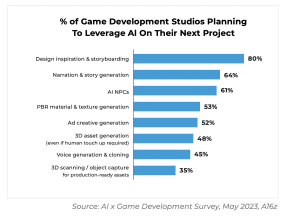Here’s How Useful AI Can Be for Web3 Applications

Blockchain and artificial intelligence (AI) together have the potential to boost each other, making the two fiels more exciting and diverse.
A new report from TenSquared Capital highlights the ways AI can enhance speed and efficiency in the Web3 arena.
Essentially, AI joining forces with Web3 has the potential to tackle tough global issues. It can also automate essential tasks, boost data-driven choices, and amp up trust and transparency for users.
The growth equity firm’s research team explored specific areas where AI can be applied to make Web3 more structured.
AI’s Power in Cross-Language Coding
AI, particularly tools like ChatGPT and Github Co-Pilot, can significantly influence the crypto industry by simplifying code writing.
These AI tools empower developers to work on various blockchains, even if they are not well-versed in a specific programming language.
For instance, if a developer is proficient in Solidity but needs to code in Rust for Cosmos, they can rely on ChatGPT/Co-Pilot to assist in the translation process, TenSquared’s report said.
“AI code-writing tools lower the barrier to entry in blockchain and allow developers to write much more quickly,” they stated.
AI not only speeds up code writing — it can also enhance blockchain infrastructure.

The tech can create smart contracts and consensus protocols that make real-time decisions using on-chain data. Furthermore, it can improve Web3 security through AI-based detection systems, ensuring more accurate and efficient smart contract decisions.
A few startups have already embraced this. For example, Oraichain employs AI-powered APIs to establish the groundwork for intelligent smart contracts and advanced decentralized applications (DApps).
Additionally, DApps can use on-chain AI for data analysis and automation.
Experts predict AI agents will use crypto for most payments, as large language models (LLMs) can handle transactions via crypto wallets and interact with smart contracts and DeFi protocols effectively.
Boosting Web3 Security
Researchers and startups are already diving into AI-based consensus methods, which are key for keeping blockchains safe and scalable.
Take Velas, for example, which is developing an AI Delegated Proof-of-Stake system.
Meanwhile, Inery is working on a way to validate blocks more efficiently based on uptime.
AI also plays a role in beefing up Web3 security, helping to fend off cyberattacks and shore up blockchain defenses. It’s a big deal because security is a major roadblock for users getting into crypto.
Just in January, Web3 took a $127m hit from hackers across 19 different incidents. And last year, cyber fraud groups made off with over $1b from the crypto industry, according to Chainalysis.
AI in Credit Scoring
AI can reshape decentralized finance (DeFi) by using historical lending data to create credit scores and improve loan decisions. For instance, Spectral’s MACRO Score is an on-chain credit score powered by advanced machine learning for DeFi lending.
Through trading bots and predictive analytics, AI can enable traders to enhance their decision-making and profit from market trends. Platforms like 3Commas offer crypto trading bots for automated strategies.
Interactive Gaming
Generative AI can personalize gaming stories and characters. For example, Inworld AI creates AI NPCs, making games like WebKinz more immersive. ASM, part of Futureverse, develops a platform for user interaction with AI Agents in gaming worlds.
AI can also enhance NFT platforms and Web3 social networks by delivering personalized content and relevant product recommendations to users.
However, Ethereum co-founder Vitalik Buterin recently warned that the toughest challenge in crypto and AI integration is creating a single, decentralized AI trusted by other applications.




